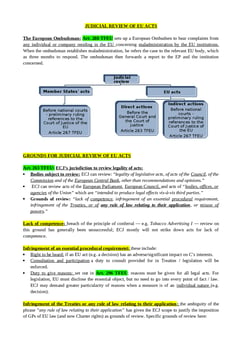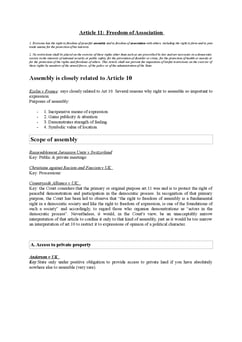41/74 Van Duyn [1974] ECR 1337
Judgement for the case 41/74 Van Duyn
Table Of Contents
KEY POINTS
Article 48 EEC was self-executing, directly impacted the legal orders of member states, and conferred individual rights enforceable by national courts.
-
A member state's exercise of rights under Article 48(3) EEC to limit free movement was subject to judicial review, particularly concerning public policy, security, or health.
Examining their nature, general scheme, and wording for directives was crucial to determining direct effects on member states and individuals.
Tests included obligations without exceptions, conditions, or the need for intervention, ensuring legal certainty.
While past associations may not have constituted personal conduct, present associations reflecting participation in an organisation's activities and alignment with its goals could be part of an individual's conduct.
Derogation from freedom of movement on public policy grounds under Article 48(3) EEC was subject to strict interpretation, allowing competent national authorities discretion within Treaty limits and Community institution control.
In imposing restrictions on public policy grounds, Member States could consider an individual's association with a socially harmful organisation, even if legal, without imposing similar restrictions on their nationals.
The Court interpreted Article 48(3) EEC and Article 3(1) of Directive 64/221 as self-executing. Current membership in a disapproved organisation could constitute 'personal conduct,' not necessarily illegal, allowing a member-state to exercise discretion and deny entry to a Community national.
FACTS
Originating in the U.S., the Church of Scientology operated in the UK through Sussex College.
-
The British Government deemed Scientology activities contrary to public policy - the Minister of Health, on July 25, 1968, labelled Scientology socially harmful, and described the Church as a pseudo-philosophical cult with authoritarian principles.
The government took measures, including denying work permits to foreign nationals at Scientology establishments.
There were no legal restrictions on Scientology practice for UK residents.
-
A Dutch national was offered a job with Scientology in May 1973.
This national was denied entry at Gatwick Airport, citing the Secretary of State's view on undesirability.
The immigration officer referenced Rule 65, an empowering refusal for the public good.
Miss van Duyn claimed the refusal was unlawful, invoking freedom of movement rules and sought a High Court declaration for the right to stay in the UK for employment.
The High Court sought a preliminary ruling from the Court of Justice on key EEC Treaty questions.
JUDGEMENT
In 1974, the Chancery Division of the High Court referred three questions to the Court under Article 177 of the EEC Treaty, stemming from a case involving a Dutch national denied entry to the UK for work with the 'Church of Scientology.'
The Court confirmed the direct applicability of Article 48 of the EEC Treaty, granting enforceable rights and abolishing discrimination for workers. Despite limitations based on public policy, judicial control safeguards individuals' rights.
Regarding Council Directive 64/221, specifically Article 3(1), the Court affirmed its direct applicability, providing enforceable rights to individuals in member-state courts. The Court rejected the presumption that directives lack direct applicability.
The third question addressed a member state's right, based on public policy, to consider an individual's association with a socially harmful organisation. The Court affirmed that such considerations, even if not unlawful, are valid in enforcing restrictions.
Costs incurred by the UK and the European Commission are non-recoverable and deferred to the national court. The Court ruled that Article 48 of the EEC Treaty and Article 3(1) of Directive 64/221 permit member states to consider an individual's association with a socially harmful organisation, even if not unlawful, in imposing restrictions justified by public policy.
COMMENTARY
The case concerns the refusal of entry to the United Kingdom for an individual associated with the Church of Scientology.
It revolves around the interpretation of Article 48 of the EEC Treaty and Directive 64/221, specifically focusing on "personal conduct" as a basis for public policy or security measures.
The Advocate General argued that these provisions were directly applicable in member-states, and a member-state has the right to consider an individual's association with an organisation deemed socially harmful, even if not unlawful, as part of their conduct.
The court emphasised the need for a balanced approach, considering the specific circumstances and the discretion of member-states in matters of public policy.
ORIGINAL ANALYSIS
The high court asked the ECJ if the provisions of EEC treaty, modified by a directive, regulating free movement of workers could have direct effect.
ECJ said that it could and that where a treaty provision or directive is binding it may have direct effect in the national courts.
It was also said that the very fact that the treaty provided for courts to refer questions to the ECJ implied that directives could be brought to national courts.
Each provision must be examined to check it is sufficiently clear, etc.
ECJ
Extended the conditions of direct effect from those used for EC Treaty articles in Van Gend en Loos to “any provision of EC law”.
RELATED CASES
For Further Study on 41/74 Van Duyn

European Law notes fully updated for recent exams at Oxford and Cambrid...
Need instant answers? Our AI exam tutor is here to help.
Ask questions 🙋 Get answers 📔 It's simple 👁️👄👁️
Our AI is educated by the highest scoring students across all subjects and schools. Join hundreds of your peers today.
Get StartedSimilar Cases
Related Product Samples
These product samples contain the same concepts we cover in this case.
| European Law | Preliminary Reference Procedure Direct Effect Notes (53 pages) |
| European Human Rights Law | The Relationship Between Eu Law And National Law Notes (21 pages) |

 Since 2010, Oxbridge Notes has been a trusted education marketplace, supplying high-quality materials from top achievers at universities like Oxford, Cambridge, LSE, Harvard, and Yale.
Since 2010, Oxbridge Notes has been a trusted education marketplace, supplying high-quality materials from top achievers at universities like Oxford, Cambridge, LSE, Harvard, and Yale.